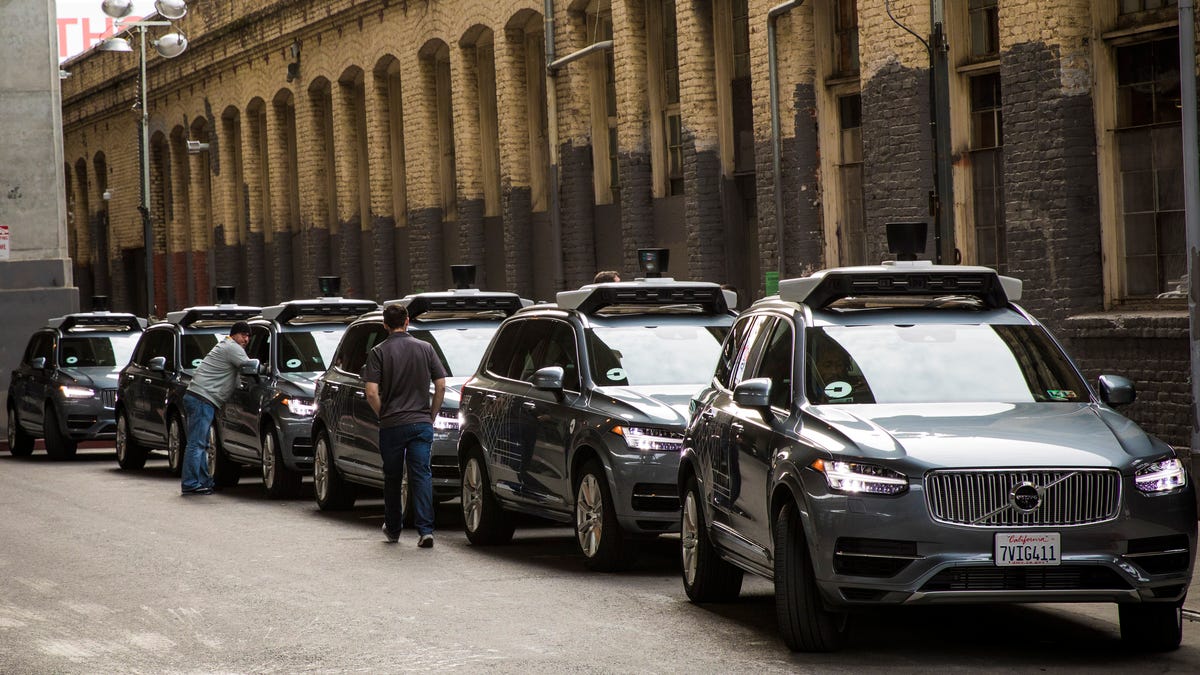CA set to allow self-driving-car tests without ride-along human
The state's DMV hopes to loosen rules around autonomous-vehicle testing, but it appears the Uber snafu didn't have anything to do with it.

Uber's self-driving cars.
If you see a car cruise by in the not-too-distant future without anyone in it, don't be alarmed.
California's Department of Motor Vehicles announced Friday that it's proposing new regulations to allow driverless testing of autonomous vehicles on state roads. Currently, California requires all testing of self-driving cars to be done with a human behind the wheel to take control if necessary.
"These rules expand our existing autonomous-vehicle testing program to include testing vehicles where no driver is present," DMV Director Jean Shiomoto said in a statement. "This is the next step in eventually allowing driverless autonomous vehicles on California roadways."
Interest and research in autonomous vehicles is a hot topic in the auto and tech industries. Automakers from Toyota to Ford to Volvo all have projects under way, and Silicon Valley giants like Google, Intel, Tesla Motors, Uber and Apple are also betting on the tech. States, such as California, Arizona and Pennsylvania, are competing to have these companies set up shop in their territory to bring jobs and commerce.
"California has more manufacturers testing autonomous vehicles than any other state and today's rules continue our leadership with this emerging technology," California Transportation Agency Secretary Brian P. Kelly said in a statement. "These rules protect public safety, promote innovation and lay out the path for future testing and deployment of driverless technology. This rulemaking is the next step in working with stakeholders to get this right."
This decision didn't appear to have anything to do with the public tussle the DMV had with Uber in December. The ride-hailing company launched its self-driving-car pilot in San Francisco without a proper permit from the DMV. Within hours of the launch, the department told the company it was breaking the law and needed to halt the program until it got a $150 permit.
Uber refused to back down, contending that the law didn't apply to it, and said it would keep the cars on the road. That led the DMV to revoke the registrations of 16 of the company's autonomous vehicles. Instead of getting the permit, Uber packed up its cars and moved to Arizona.
However, the ride-hailing company finally backed down earlier this week and got the permit. It's now testing two autonomous vehicles in San Francisco.
One of the key issues complicating Uber's initial rollout was concern for public safety. The day of Uber's launch in San Francisco, one of the self-driving cars was filmed running a red light. Similar incidents were reported throughout the city in the following days.
Most companies working on self-driving cars tout the vehicles as a potentially safer alternative to human drivers. And for the most part, testing of the technology has shown the cars to be safe. However, Uber isn't the only company to have experienced issues. Among other incidents, a self-driving Google car was involved in a collision.
The DMV said it received feedback from self-driving-car companies, consumer advocates, local government and insurance companies in making its decision to pursue regulations that would allow driverless vehicle testing.
You won't see any of these cars on the open road yet, however. The DMV must first get the proposed regulations passed, which it expects to do by the end of this year. The first step in that process is public hearings, which will be held in Sacramento in late April.
"It is critical that the public is given accurate information regarding the vehicles' autonomous capability," Brian Soublet, chief legal counsel for the DMV, said in a media call Friday.
Batteries Not Included: The CNET team reminds us why tech is cool.
CNET Magazine: Check out a sample of the stories in CNET's newsstand edition.

